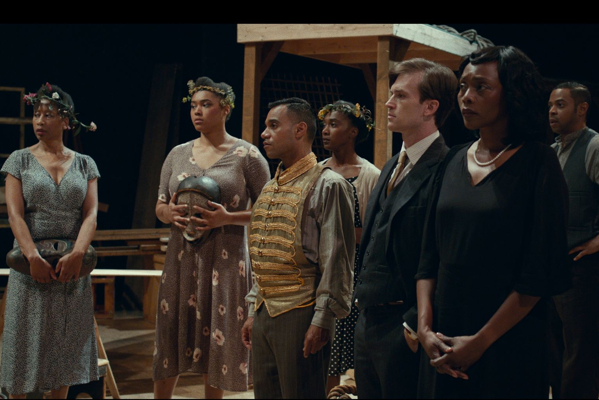
‘Voodoo Macbeth’ dramatizes Orson Welles’ Black Haitian Macbeth
By Diane Carson
Based on a true, remarkable story, “Voodoo Macbeth” finds producer John Houseman in 1935 enticing twenty-year old Orson Welles, yes, that Orson Welles, to direct an all-Black theater production of Shakespeare’s Macbeth at Harlem’s Lafayette Theater. Eventually using a mythical Haitian island as the setting, the Scottish play becomes known as “Voodoo Macbeth,” hence this film’s title.
In Depression-era America, co-administrators of the Negro Theatre Unit, Rose McClendon and Houseman will face their own challenges: health for actress McClendon and the federal funding channeled from the U.S. Works Project Administration for Houseman. In addition, in the course of the play’s production, additional multiple crises arise, both political and personal. Welles resists the director’s job, and after accepting because of his wife’s idea for the Haitian setting, has difficulty hiring professional actors. Rose faces what becomes a life-threatening medical condition and disputes arise from an ex-boxer with alcohol troubles, a compulsion shared by Welles. The sleezy, racist Senator Martin Dies threatens to cancel funds for this Federal Theatre Project. Other problems include homophobia, stage fright paralyzing cast members, Welles in blackface, marriage quarrels, and shifting witchcraft to voodoo. In fact, in the actual adaptation, Welles used Haitian music and magical realism against the backdrop of the court of King Henri Christophe, a Haitian Revolution leader.
Bash Achkar’s cinematography and Emma Bradford’s art direction provide effective compositions and art design. Jewell Wilson Bridges captures Welles’ egotism, as the Black cast deserves the real credit for salvaging the production. Daniel Kuhlman is an appealingly understated Houseman, while Inger Tudor as Rose McClendon, a Harlem Renaissance luminary, shines with her composed performance as the initially cast Lady Macbeth. But, overall, “Voodoo Macbeth” lacks cinematic, stirring drama, often feeling too staged. Admirably, however, the idea behind this film’s production is daring. A group of ten directors and eight writers collaborated. Commendably and surprisingly, coherence pervades the film. Credit this to the University of Southern California student team for choosing to wrestle with this momentous, fraught enterprise. Check listings and streaming options for “Voodoo Macbeth.”


